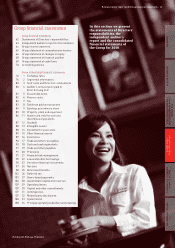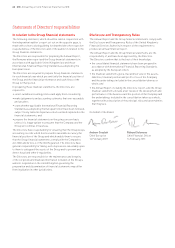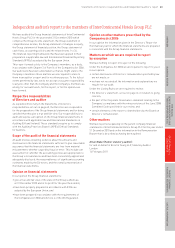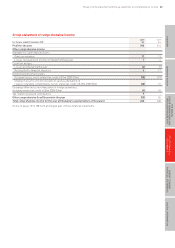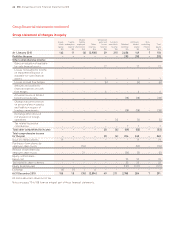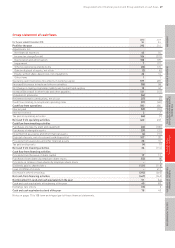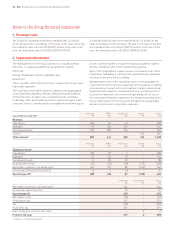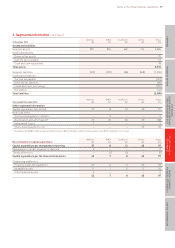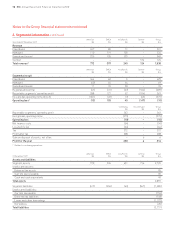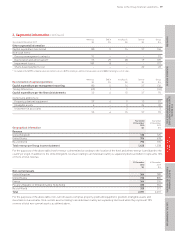Holiday Inn 2010 Annual Report Download - page 72
Download and view the complete annual report
Please find page 72 of the 2010 Holiday Inn annual report below. You can navigate through the pages in the report by either clicking on the pages listed below, or by using the keyword search tool below to find specific information within the annual report.70 IHG Annual Report and Financial Statements 2010
General information
The consolidated financial statements of InterContinental Hotels
Group PLC (the Group or IHG) for the year ended 31 December 2010
were authorised for issue in accordance with a resolution of the
Directors on 14 February 2011. InterContinental Hotels Group PLC
(the Company) is incorporated in Great Britain and registered in
England and Wales.
Summary of significant accounting policies
Basis of preparation
The consolidated financial statements of IHG have been prepared
in accordance with International Financial Reporting Standards
(IFRSs) as adopted by the European Union and as applied in
accordance with the provisions of the Companies Act 2006.
Changes in accounting policies
With effect from 1 January 2010, the Group has implemented
the following new accounting standards, amendments and
interpretations. None of these have had a material impact on the
Group’s financial performance or position during the year and there
has been no requirement to restate prior year comparatives.
• IFRS 3 (Revised) ‘Business Combinations’ changes the accounting
for transaction costs, the valuation of non-controlling interests,
the initial recognition and subsequent measurement of contingent
consideration, and business combinations achieved in stages.
These changes will impact the amount of goodwill recognised
and the reported results in the period when an acquisition occurs
and future reported results. These changes only apply to new
acquisitions and there have been none during the year.
• IAS 27 (Revised) ‘Consolidated and Separate Financial
Statements’ requires the effects of all transactions with non-
controlling interests to be recorded in equity if there is no change
in control and such transactions no longer result in goodwill or
gains and losses. The standard also specifies the accounting
when control is lost; any remaining interest in the entity is
remeasured to fair value with a gain or loss recognised in profit
or loss.
• IFRIC 17 ‘Distribution of Non-cash assets to Owners’ provides
guidance on accounting for arrangements where non-cash
assets are distributed to shareholders.
• IAS 39 (amendment) ‘Financial Instruments: Recognition and
Measurement – Eligible Hedged Items’ clarifies that an entity is
permitted to designate a portion of the fair value changes or cash
flow variability of a financial instrument as a hedged item. The
amendment also specifies that inflation is not a separately
identifiable risk and cannot be designated as the hedged risk
unless it represents a contractually specified cash flow.
• IFRS 2 (amendment) ‘Share-based Payment: Group Cash-settled
Share-based Payment Arrangements’ provides guidance on
accounting for inter-group cash-settled share-based payment
transactions in the separate financial statements of an entity.
• IFRS 5 (amendment) ‘Non-current Assets Held for Sale and
Discontinued Operations’ clarifies that disclosures required in
respect of non-current assets and disposal groups classified as
held for sale or discontinued operations are only those set out
in IFRS 5.
• IFRS 8 (amendment) ‘Operating Segments’ clarifies that segment
assets and liabilities need only be reported when included in
information reviewed by the chief operating decision maker.
• IAS 7 (amendment) ‘Statement of Cash Flows’ states that only
expenditure resulting in recognition of an asset can be presented
as a cash flow from investing activities.
• IAS 17 (amendment) ‘Leases’ clarifies that a lease of land should
be classified as an operating or finance lease in accordance with
the economic substance of the arrangement.
• IAS 36 (amendment) ‘Impairment of Assets’ clarifies that the
largest permitted unit for allocation of goodwill is the IFRS 8
operating segment before aggregation for reporting purposes.
• IFRIC 16 (amendment) ‘Hedges of a Net Investment in a Foreign
Operation’ removes the restriction on a hedged foreign operation
holding the hedging instruments.
Changes in presentation
The Group statement of changes in equity has been expanded
to include an analysis of other comprehensive income by each
component of equity. The additional information is presented in
accordance with best practice and will become mandatory in 2011.
The fair values of derivative financial instruments are presented
separately on the face of the Group statement of financial position for
the first time (previously included within current ‘Trade and other
payables’) due to their increased materiality and in accordance with
best practice.
Net debt has been redefined to include the exchange element of
the fair value of currency swaps that fix the value of the Group’s
£250m 6% bonds. This change has been made to reflect the
commercial rationale of the hedging relationship. See notes 23
and 24 for further details.
Presentational currency
The consolidated financial statements are presented in millions
of US dollars following a management decision to change the
reporting currency from sterling during 2008. The change was
made to reflect the profile of the Group’s revenue and operating
profit which are primarily generated in US dollars or US dollar-
linked currencies.
The currency translation reserve was set to nil at 1 January 2004
on transition to IFRS and this reserve is presented on the
basis that the Group has reported in US dollars since this date.
Equity share capital, the capital redemption reserve and shares
held by employee share trusts are translated into US dollars at
the rates of exchange on the last day of the period; the resultant
exchange differences are recorded in other reserves.
The functional currency of the parent company remains sterling
since this is a non-trading holding company located in the United
Kingdom that has sterling denominated share capital and whose
primary activity is the payment and receipt of interest on sterling
denominated external borrowings and inter-company balances.
Accounting policies



